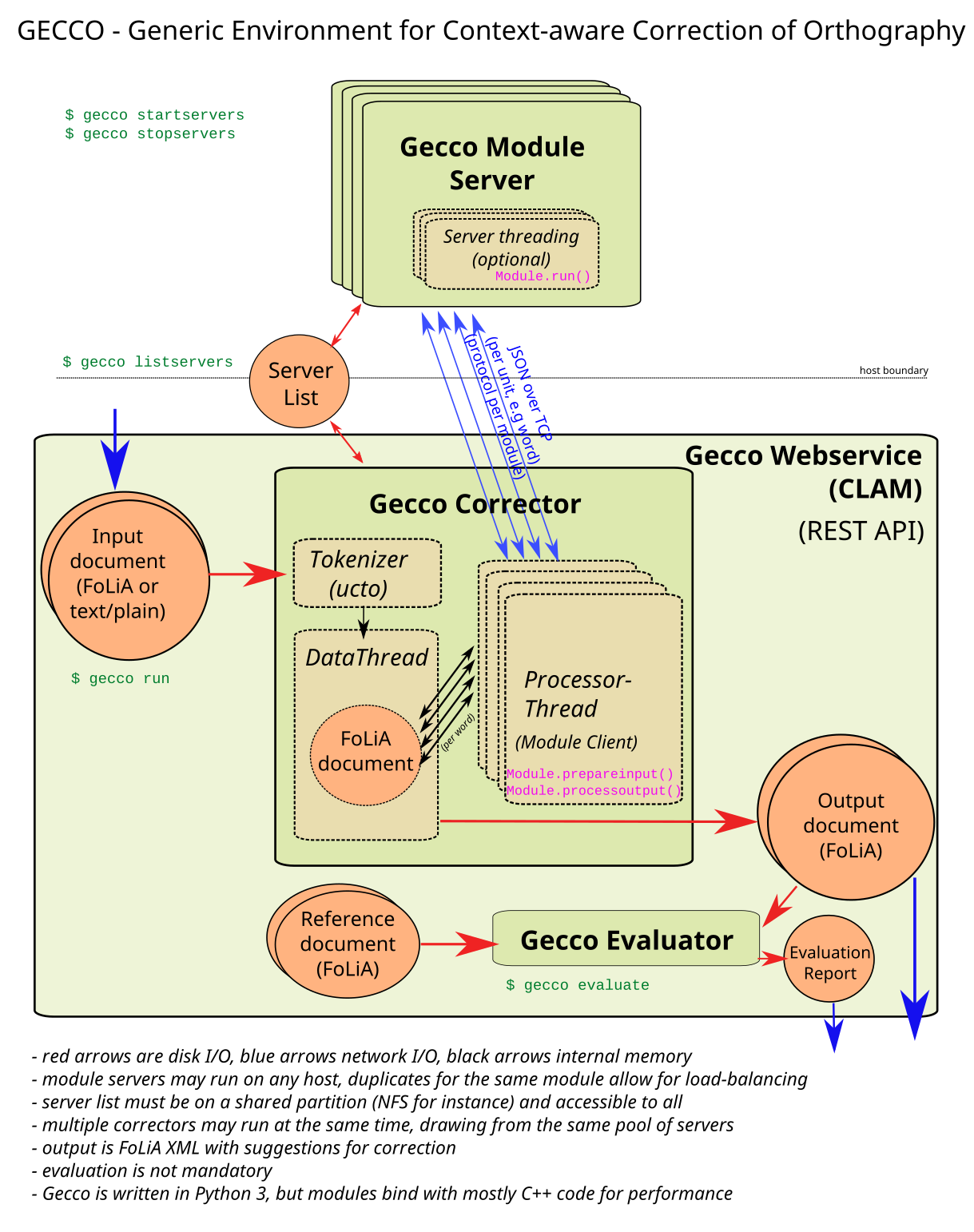Generic Environment for Context-Aware Correction of Orthography
========================================================================
by Maarten van GompelCentre for Language and Speech Technology, Radboud University NijmegenSponsored by Revisely (http://revise.ly)Licensed under the GNU Public License v3
Gecco is a generic modular and distributed framework for spelling correction. Aimed to
build a complete context-aware spelling correction system given your own data
set. Most modules will be language-independent and trainable from a source
corpus. Training is explicitly included in the framework. The framework aims to
easily extendible, modules can be written in Python 3. Moreover, the framework
is scalable and can be distributed over multiple servers.
Given an input text, Gecco will add various suggestions for correction.
The system can be invoked from the command-line, as a Python binding, as a
RESTful webservice, or through the web application (two interfaces).
Modules:
Features
Gecco is the successor of Valkuil.net and Fowlt.net.
Gecco relies on a large number of dependencies, including but not limited to:
Dependencies:
To install Gecco, we strongly recommend you to use our LaMachine
distribution, which can be obtained from https://github.com/proycon/lamachine .
LaMachine includes Gecco and can be run in multiple ways: as a virtual machine,
as a docker app, or as a compilation script setting up a Python virtual
environment.
Gecco uses memory-based technologies, and depending on the models you train,
may take up considerable memory. Therefore we recommend at least 16GB RAM,
training may require even more. For various modules, model size may be reduced
by increasing frequency thresholds, but this will come at the cost of reduced
accuracy.
Gecco will only run on POSIX-complaint operating systems (i.e. Linux, BSD, Mac OS X), not on Windows.
To build an actual spelling correction system, you need to have corpus sources
and create a gecco configuration that enable the modules you desire with the
parameters you want.
A Gecco system consists of a configuration, either in the form of a simple Python
script or an external YAML configuration file.
Example YAML configuration:
name: fowltpath: /path/to/fowltlanguage: enmodules:- module: gecco.modules.confusibles.TIMBLWordConfusibleModuleid: confusiblessource:- train.txtmodel:- confusible.modelconfusibles: [then,than]
To list all available modules and the parameters they may take, run gecco --helpmodules.
Alternatively, the configuration can be done in Python directly, in which case
the script will be the tool that exposes all functionality:
from gecco import Correctorfrom gecco.modules.confusibles import TIMBLWordConfusibleModulecorrector = Corrector(id="fowlt", root="/path/to/fowlt/")corrector.append( TIMBLWordConfusibleModule("thenthan", source="train.txt",test_crossvalidate=True,test=0.1,tune=0.1,model="confusibles.model", confusible=('then','than')))corrector.append( TIMBLWordConfusibleModule("its", source="train.txt",test_crossvalidate=True,test=0.1,tune=0.1,model="confusibles.model", confusible=('its',"it's")))corrector.append( TIMBLWordConfusibleModule("errorlist", source="errorlist.txt",model="errorlist.model", servers=[("blah",1234),("blah2",1234)] )corrector.append( TIMBLWordConfusibleModule("lexicon", source=["lexicon.txt","lexicon2.txt"],model=["lexicon.model","lexicon2.model"], servers=[("blah",1235)] )corrector.main()
It is recommended to adopt a file/directory structure as described below. If you plan on using multiple hosts, you should store it on a shared network drive so all hosts can access the models:
An example system spelling correction system for English is provided with Gecco and resides in the example/ directory.
gecco <yourconfig.yml> run <input.folia.xml> is executed to process a given
FoLiA document or plaintext document, it starts a master process that will
invoke all the modules, which may be distributed over multiple servers. If
multiple server instances of the same module are available, the load will be
distributed over them. Output will be delivered in the FoLiA XML format and
will contain suggestions for correction.
To start module servers on a host, issue gecco <yourconfig.yml> startservers.
You can optionally specify which servers you want to start, if you do not want
to start all. You can start servers multiple times, either on the same or on
multiple hosts. The master process will distribute the load amongst all
servers.
To stop the servers, run gecco <yourconfig.yml> stopservers on each host that
has servers running. A list of all running servers can be obtained by `gecco
Modules can also run locally within the master process rather than as servers,
this is done by either by adding local: true in the configuration, or by
adding the --local option when starting a run. But this will have a
significant negative impact on performance and should therefore be avoided.

Invoke all gecco functionality through a single command line tool
$ gecco myconfig.yml [subcommand]
or
$ myspellingcorrector.py [subcommand]
Syntax:
usage: gecco [-h]{run,startservers,stopservers,startserver,train,evaluate,reset}...Gecco is a generic, scalable and modular spelling correction frameworkCommands:{run,startservers,stopservers,startserver,train,evaluate,reset}run Run the spelling corrector on the specified input filestartservers Starts all the module servers that are configured torun on the current host. Issue once for each host.stopservers Stops all the module servers that are configured torun on the current host. Issue once for each host.listservers Lists all the module servers on all hostsstartserver Start one module's server on the specified port, use'startservers' insteadtrain Train modulesevaluate Runs the spelling corrector on input data and comparesit to reference data, produces an evaluation reportreset Reset modules, deletes all trained models that havesources. Issue prior to train if you want to startanew.
Vital documentation regarding all modules and the settings they take can be obtained through:
$ gecco --helpmodules
RESTUL webservice access will be available through CLAM. We are still working
on better integration of this in Gecco. FOr now, an example implementation of
this can be seen here:
https://github.com/proycon/valkuil-gecco/tree/master/valkuilwebservice
A web-application will eventually be available, modelled after Valkuil.net/Fowlt.net.